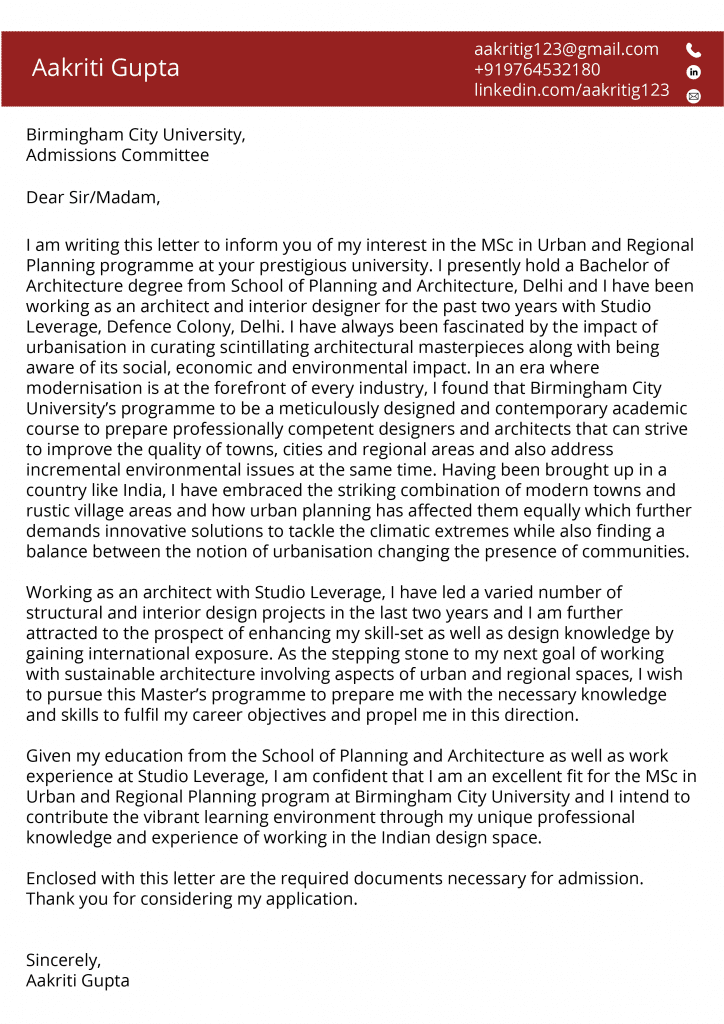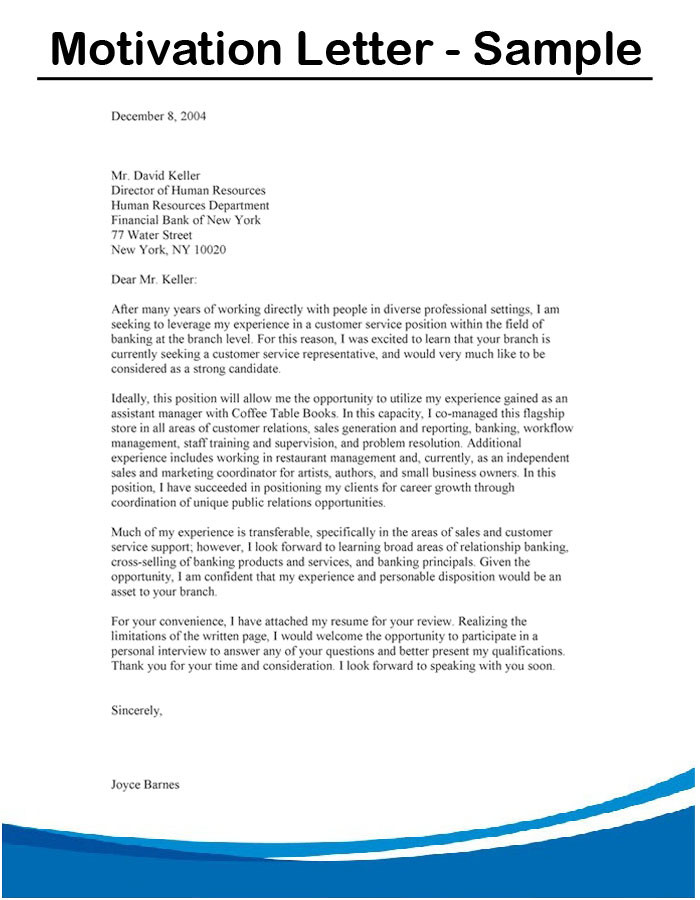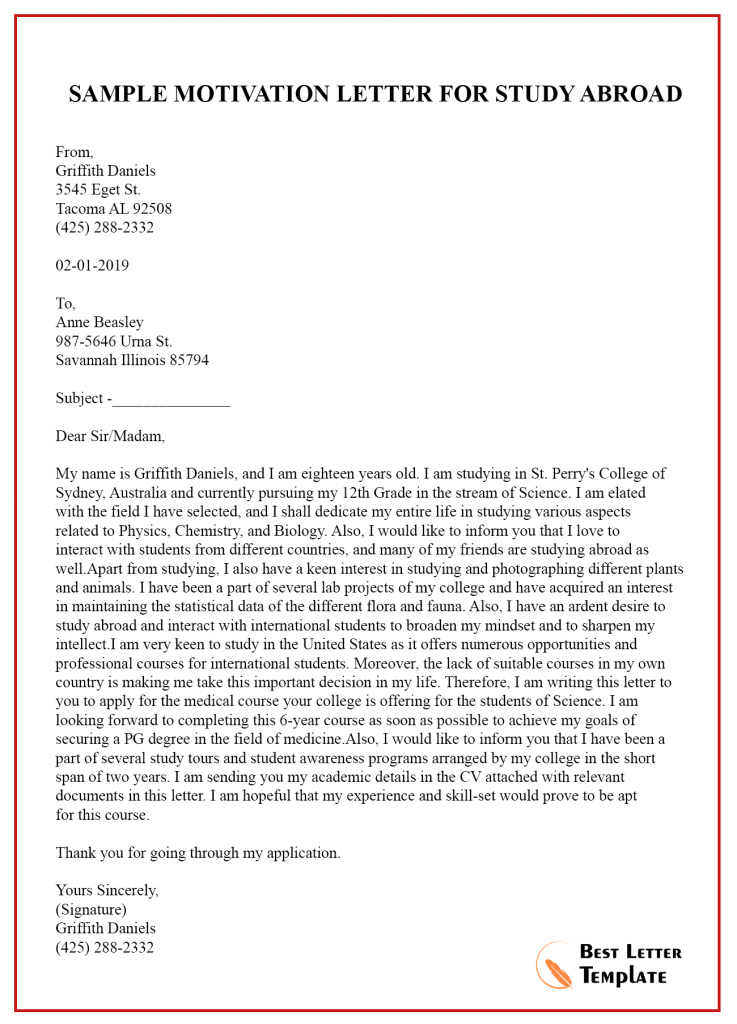A Motivation Letter is a powerful tool that goes beyond the facts listed on your resume, offering a deeper insight into your passion, commitment, and goals. While your resume outlines your qualifications and achievements, it doesn’t convey the personal drive or enthusiasm that sets you apart. This is where a motivation letter becomes essential.
Whether applying for a university program, a job, or an internship, a well-crafted motivation letter can make all the difference. In this guide, we’ll show you how to write a compelling motivation letter, with examples for various applications to help you stand out.
This Blog Includes:
- What is a Motivation Letter?
- When Do You Need a Motivation Letter?
- How to Structure a Motivation Letter?
- Format for Letter of Motivation
- How to Write a Motivation Letter?
- Difference Between a Motivational Letter and a Cover Letter?
- Example of Motivation Letter
- Motivation Letter Template
- Dos and Don’ts
- Motivation Letter Sample for University
- Motivation Letter Sample for Internship
- Sample of Motivation Letter for Scholarship Application
- Sample Motivation Letter for Job Application: 1
- Sample Motivation Letter for Job Application: 2
- Motivation Letter for Study Abroad
- FAQs
What is a Motivation Letter?
A motivation letter is a document typically required as part of an application process, where you explain why you are interested in a particular job, university program, or scholarship. Unlike a CV or resume, which lists your qualifications, the motivation letter focuses on your personal reasons for applying and highlights your passion for the opportunity.
A motivation letter is usually a one-page document that gets attached alongside your resume. Commonly, there are 4 purposes for which one is required to draft a letter of motivation:
- For Admission: If you are applying to a university or college to get enrolled in an educational program at any level (undergraduate degree or postgraduate degree).
- For Training/Internship: If you want to get into a full-time internship with an organisation.
- For Employment: When you want to apply for a job profile at an organisation.
- For Jobs in the Social Sector, especially NGOs: Non-profit organisations generally demand motivation letters to analyse the interests and intentions of job aspirants.
When Do You Need a Motivation Letter?
A motivation letter is a key element in various application processes, including job applications, university admissions, and scholarship requests. It provides an opportunity to express your enthusiasm, goals, and why you are an ideal candidate for the opportunity. Below are the primary situations where a motivation letter is required:
- Job Applications: Many employers request a motivation letter alongside your resume to gain insight into your interest in the role, how your skills align with the company’s values, and the potential contributions you can make to their goals.
- University Admissions: Universities often ask for motivation letters to assess your dedication to the field, career goals, and academic readiness. It helps them determine if you are a suitable match for the program.
- Scholarship Applications: Motivation letters are commonly required for scholarship applications, as they provide an opportunity to explain your financial needs, career plans, and why you are deserving of financial support.
- Graduate Programs (Master’s and PhD): For master’s and PhD applications, motivation letters are used by committees to evaluate whether your research interests are a good fit for the program. Given the limited spots available, they help determine if you will make the best use of the department’s resources and research opportunities.
A well-written motivation letter can greatly enhance your application, offering a clear picture of your dedication and qualifications in a competitive selection process.
Related Read: Career Objective for Resume
How to Structure a Motivation Letter?
When applying to your dream institution or organisation, presenting your motivations effectively can make all the difference. A well-structured motivation letter should ideally be one page long, where you introduce yourself, highlight your qualifications and achievements, and align your interests with the course or position you’re applying for.
Understanding the structure of your letter is crucial to ensuring it includes all key elements. Here are two common structures for writing a motivation letter:
The 3-Paragraph Structure (Traditional Approach)
- Introduction: Introduce yourself and explain the purpose of your application.
- Body: Describe your qualifications, achievements, and relevant skills.
- Conclusion: Summarise your motivation, reiterate why you’re a perfect fit, and express enthusiasm for the opportunity.
The 5-7 Paragraph Structure (Detailed Approach)
- In this format, the body is divided into 5-7 short paragraphs, each focusing on one key point or achievement.
- Each paragraph should consist of 1-3 sentences to keep the content concise and impactful.
How to Choose the Right Structure?
- For a More Factual Letter: If you have multiple achievements to showcase, the 5-7 paragraph format allows you to highlight each one separately, providing clear, structured points.
- For a Storytelling Approach: If you prefer to keep the narrative cohesive, the 3-paragraph format is ideal. It flows naturally without too many breaks and gives a more personal, engaging touch.
Ultimately, choose the structure that best suits your achievements and the tone you want to convey in your letter.
Format for Letter of Motivation
The format of your motivation letter is important to make a good impression. Here is the motivation letter format to understand how to structure a motivation letter effectively:
| Section | Content |
| Header | Your contact information, date, and the recipient’s details |
| Salutation | Formal greeting (e.g., “Dear Mr./Ms. [Last Name]”) |
| Introduction | State the purpose of the letter, mention the position or program |
| Body Paragraphs | Explain your qualifications, skills, motivation, and goals |
| Conclusion | Summarize and express appreciation, offer further discussion |
| Closing | Formal closing (e.g., “Sincerely,” followed by your name) |
Formatting Tips:
- Keep your letter to one page (around 300-500 words)
- Use a professional font (e.g., Arial, Times New Roman) in size 11-12
- Maintain 1.5 line spacing and ensure clear margins
- Proofread for spelling and grammatical errors
Common Formatting Mistakes to Avoid in a Motivation Letter
Writing a motivation letter can be tricky, and even small errors can detract from your message. Here are some common mistakes to avoid:
- Generic Content: Avoid using the same letter for multiple applications. Personalise it to each opportunity.
- Overly Long Letters: Keep it concise. Focus on the key points and avoid rambling.
- Lack of Enthusiasm: Show genuine passion for the role or program.
- Focusing on Weaknesses: Focus on your strengths and potential rather than emphasising weaknesses.
- Ignoring the Employer’s Needs: Tailor your letter to address what the company or institution is looking for.
How to Write a Motivation Letter?
A motivation letter is written for different purposes, such as for internships, job applications, university, etc. Now that you know about a motivation letter, you should learn how to write one. The best way to write it is by creating a genuine letter.
Body of Motivation Letter
This is the main body of the letter. Describe your achievements, academic and professional journey, and career aspirations. Elaborate on your skills and passions, elucidating your zeal for your chosen course or job profile. Keep it factual and concise. Most of the time, the made-up stories get easily caught by the professionals who examine a variety of letters every day. It is strongly advised to maintain precision in your story. To cite the authenticity of your qualifications, you can also use metrics.
Have a quick example of a motivational letter for some major add-ons:
- My passion for ____ began when ______.
- I aspire to _____ because ______.
- I have been a part of _____ for _____ months/years. It’s the best thing for me because of ______.
- I remember once when I______ which made me realize that I_____.
- _______ resonates with me because ______.
- What distinguishes me from my peers is _______.
Motivation Letter Example:
| My Passion for Online Marketing started to spring during my internship at _____ (Company Name). Working in a small startup provided me with surface-level experience in most digital marketing channels. Now, I would like to delve into and gain know-how by attending the ______(University Name) program in Digital Marketing. |
Conclusion
Finally, to conclude, you can wrap up your letter and read it thoroughly before sending it. Here are some of the points to help you with the concluding paragraph of the Motivation letter.
- Summarise your major points: “I believe that I would be an appropriate fit for the program because of _____”
- Mention your long-term goals: “I would be obliged to be a part of _____, as it would allow me to _____ ”
- Finally, pay regards to the reader with a ‘thank you’.
You can now download the PDF provided below, which will guide you on how to write a Motivation Letter. Use it to craft your own personalised letter
Difference Between a Motivational Letter and a Cover Letter?
Often, students and applicants confuse a motivation letter with a cover letter, but each serves a distinct purpose. It is essential to understand the differences to ensure you use the correct document for your application. Below, we have outlined the key distinctions between the two letters:
Often, students and applicants confuse a motivation letter with a cover letter, but each serves a distinct purpose. It is essential to understand the differences to ensure you use the correct document for your application. Below, we have outlined the key distinctions between the two letters:
| Aspect | Motivation Letter | Cover Letter |
| Purpose | Focuses on your motivations, goals, and how they align with the program or job you’re applying for. | Highlight specific skills and experiences mentioned in your resume, tailored to the job description. |
| Usage | Primarily used for university applications, scholarships, internships, or personal development programs. | Primarily used for job applications, accompanying your resume or CV. |
| Content | Explains why you are passionate about the field or job and how your aspirations match the opportunity. | Provides a professional introduction to your resume, summarizing relevant experience and skills. |
| Tone and Focus | Personal, aspirational, and focused on aligning your ambitions with the opportunity. | Professional, concise, and focused on your qualifications for the job. |
| Audience | Admissions committees, scholarship panels, or academic departments. | Employers, hiring managers, or recruiters. |
| Length | Typically longer, providing more insight into your personal motivations and aspirations. | Shorter, typically one page, directly addressing how your qualifications meet the job requirements. |
| Key Features | Focuses on your passion, interests, and why you’re a perfect fit for an academic program or role. | Focuses on your skills, qualifications, and how you align with the job profile. |
Example of Motivation Letter
A Motivation Letter Example serves as a valuable reference when crafting your own letter. It provides a clear structure and demonstrates how to effectively communicate your passion, qualifications, and aspirations. By reviewing Letter of motivation examples, you can gain insight into how to tailor your letter to specific academic programs, job roles, or scholarship opportunities, ensuring it stands out to your audience.

Motivation Letter Template
Below, we have provided a versatile motivation letter template that you can customize to suit your unique qualifications, motivations, and aspirations. For example, here is an introduction for a motivation letter for a PhD application at a university:
| To: School/Institution Name [email protected] Phone Number Relevant Social Media Handles (LinkedIn, Quora) Dear ____ My name is (_____) and I would like to express my interest in applying for the Doctoral program (PhD) in Political Science at _____ (university name). I have always dreamed of becoming a politician and helping give back to my country, and I believe that a PhD in Politics from ______ (University Name) would set me miles ahead to reaching my goal. Sincerely Your Name |
Dos and Don’ts
Sometimes, conveying your zeal to enter an academic program or an organization cannot be absolutely done by a resume as it restricts you to putting forward only the facts and figures instead of the inspirations and motivation that urged you to pursue it. This is where a motivation letter comes into view to ensure that your application stands out from the horde of other documents. Below are some quick tips and tricks to draft your motivation letter:
- While writing the letter, make sure you know the concerned person to whom you are applying. Research the name and designation of the concerned individual and address them accordingly.
- Gauge the requirements of the program/profile and explain how you are the right fit for it.
- Mention how your beliefs and interests align with the organisation/university’s vision and mission
Are you planning to study abroad? Have a look at our blog on the Sponsorship Letter for Visa
Motivation Letter Sample for University
Once you are familiarised with the structure and elements of a motivation letter, let’s provide you with some motivation letter examples and samples to help you understand the tone and style as well.

Motivation Letter Sample for Internship

Sample of Motivation Letter for Scholarship Application

Sample Motivation Letter for Job Application: 1

Sample Motivation Letter for Job Application: 2

Motivation Letter for Study Abroad

Tips for Writing A Good Motivation Letter
A motivation letter is your chance to make a lasting impression by highlighting why you’re the perfect fit for the program or job you’re applying for. To ensure your letter stands out, follow these essential tips:
- Be Specific: Mention specific skills or experiences that make you a strong candidate.
- Be Honest: Don’t exaggerate your achievements. Honesty builds trust with the reader.
- Show Enthusiasm: Employers and institutions want to see that you’re excited about the opportunity.
- Tailor Your Letter: Customize your letter for each position or program to demonstrate that you’ve done your research.
Crafting a well-written motivation letter can significantly improve your chances of securing a job, university place, or scholarship. Remember to proofread your letter and avoid common mistakes to make a lasting impression.
Also Read: SOP for Project Management: Format, PDF Sample, and Tips
FAQs
A motivation letter is a document you submit alongside your resume or application to explain your reasons for applying to a program, job, or organisation. It highlights your motivations, skills, qualifications, and why you’re a strong candidate for the opportunity.
The best way to write a motivation letter is to write down all your ideas, experiences, and achievements, align them with your future career goals, and then craft a creative and thoughtful essay to impress your employers or university admissions officer.
A motivation letter is designed to help the employer gain insight into why you are the perfect candidate for the position. Following the proper structure, writing short sentences, and talking about your experiences, skills, and education is essential for a motivation letter.
‘Yours sincerely’ or ‘Best Regards’ or ‘Thank you for your time’ are perfect sentences to end a motivational letter.
Ans: Motivation letter example for a job:
Dear _____ [Name of Hiring Manager],
I am writing to apply for the ____[Job Title] position at ______[Company Name]. With my experience in _____ years [relevant field], combined with my passion for ______ [specific industry], I am confident that my skills and dedication will make me a valuable asset to your team. I look forward to discussing how I can contribute to ______ [Company Name]’s success.
Sincerely,
________ [Your Name]
Yes, many universities require a motivation letter as part of the admissions process. This letter explains your passion for the program, your career goals, and why you believe you’re a good fit for the university.
Sample motivation letter for university admission:
Dear Admissions Committee,
I am writing to apply for the _________ [Program Name] at __________ [University Name]. With a strong academic background and a deep interest in _____[field], I am eager to expand my knowledge and contribute to the university’s vibrant academic community. I believe this program will help me achieve my long-term goals in ________[career path].
Sincerely,
_______[Your Name]
Related Articles
We hope this blog on ‘Motivation Letter’ was informative and helped you improve your English skills. You can also follow the Learn English page of Leverage Edu for more exciting and informative blogs related to English grammar and the English language.

 One app for all your study abroad needs
One app for all your study abroad needs





















 60,000+ students trusted us with their dreams. Take the first step today!
60,000+ students trusted us with their dreams. Take the first step today!

